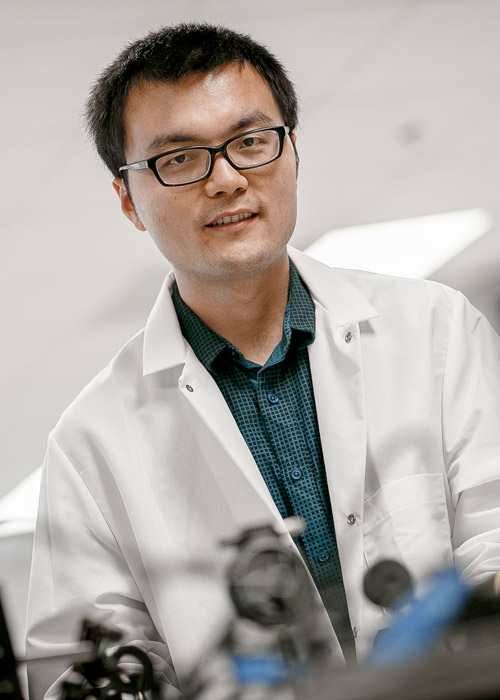Jonsson School Engineer Opens New Avenue for Brain Cancer Treatment
By: Amanda Siegfried | March 11, 2019
A University of Texas at Dallas researcher has received a $900,000, three-year grant from the Cancer Prevention and Research Institute of Texas (CPRIT) to continue his work developing a new way to deliver cancer drugs to brain tumors.

Dr. Zhenpeng Qin
Dr. Zhenpeng Qin, assistant professor of mechanical engineering, received the grant for his investigation of a novel way to get therapeutic drugs past the blood-brain barrier (BBB), which is composed of densely packed cells that restrict and actively prevent the passage of substances from the bloodstream to the brain.
At UT Dallas, this research also draws expertise from Drs. Heather Hayenga, Taylor Ware and Shashank Sirsi, assistant professors of bioengineering, who will contribute to various aspects of the project.
The work also involves collaboration with UT Southwestern Medical Center researchers Dr. Robert Bachoo and Dr. Edward Pan, both associate professors of neurology and neurotherapeutics.
Qin’s grant is one of 42 new CPRIT awards totaling close to $96 million announced by the agency in February. Since 2010, CPRIT has awarded 1,372 grants totaling almost $2.3 billion.
Including Qin’s new award, 10 UT Dallas researchers have received 16 CPRIT grants totaling more than $13 million.
Qin’s cancer research focuses on inducing tiny nanoscale forces to pry open the blood-brain barrier.
The technique relies on first engineering nanoparticles with an antibody that allows the particles to bind to the innermost cells lining the brain blood vessels, the endothelial cells, which form the blood-brain barrier. Once delivered intravenously, nanoparticles bind to those endothelial cells that are adjacent to tight-junction proteins located between endothelial cells. With the nanoparticles in position, Qin’s team directs a pulsating, near-infrared laser directly onto the nanoparticles.
“We’re using a very short pulse of light, tenths of a billionth of a second,” Qin said.
“This temporary opening of the [blood-brain barrier] presents a unique window to deliver chemotherapy drugs, the vast majority of which do not cross the barrier.”
Dr. Zhenpeng Qin, assistant professor of mechanical engineering
Once a nanoparticle absorbs the laser light, the absorbed energy causes very confined changes in the nanoparticle and surrounding water.
Bachoo said the resulting nanoscale event seems to cause a very specific “unzippering” of the blood-brain barrier that allows molecules to pass through.
“Remarkably, this unzippering of the BBB can be graded by delivering different levels of energy to the nanoparticles,” Qin said. “Our team has found that it is entirely reversible after six to 12 hours and causes no lasting damage to the endothelial cells or the surrounding neurons. This temporary opening of the BBB presents a unique window to deliver chemotherapy drugs, the vast majority of which do not cross the barrier.”
The technique opens up a new paradigm of possibilities to be explored, Qin said. It has been tested in cultured cells as well as in animal models. The new CPRIT funding will support investigating the fundamental mechanisms, developing approaches to better deliver light into the brain and testing the efficacy of the technique to treat brain tumors.
Qin’s most recent grant follows two previous CPRIT grants, each for $200,000, that he received in 2016 and 2018.
Media Contact:
Amanda Siegfried, UT Dallas, 972-883-4335, amanda.siegfried@utdallas.edu, or the Office of Media Relations, UT Dallas, (972) 883-2155, newscenter@utdallas.edu.





